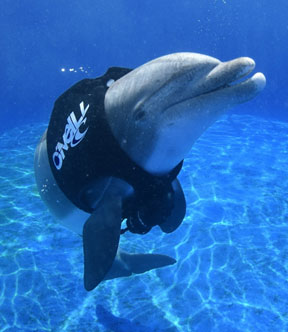Campus News
Celebrating Primo and his remarkable life as a champion of cetacean science and conservation
On Thursday June 27, 2019 Primo’s 40-year-old heart performed its last beat. For 25 years, the rhythmic pulse of his heart was central to our cetacean biology program at the Long Marine Lab campus of UC Santa Cruz.

On Thursday June 27, 2019 Primo’s 40-year-old heart performed its last beat. For 25 years, the rhythmic pulse of his heart was central to our cetacean biology program at the Long Marine Lab campus of UC Santa Cruz. The detailed, roller-coaster changes in Primo’s heart rate as he swam and dived with graceful agility had never been witnessed before in any dolphin or whale; no one knew what happened to a dolphin’s heart when they exercised underwater. His was the first deep-dive electrocardiogram ever measured for a freely-swimming cetacean. That scientific discovery was made possible by a fortuitous combination of miniaturized suction-cup tag technology, dogged scientific persistence, the creativity of his dedicated long-time trainers who included Traci Kendall and Beau Richter, and of course, Primo’s enthusiastic willingness to be a part of our science.
Unlike more skittish dolphins, Primo was bold—his trainers might even say stubborn—and always relished the challenge of a good scientific problem to solve. Perhaps it was his military training that shaped his steadfast spirit, for Primo was a veteran of the U.S. Navy Mine-Hunting Program during the Gulf War years of the early 90s. It was my shared luck to be assigned with Primo to the research arm of that Naval program in Hawaii; our luck continued when government base closures resulted in Primo’s retirement and college-assisted military discharge in 1994 to Long Marine Lab, where I had just started working.
When his military service and age prevented release back into the wild, Primo became our scientific partner and teacher of all things dolphin. His first scientific paper about the energy dolphins saved while surfing the wakes of boats made the cover of the international scientific journal, Nature, with the headline “Why Dolphins Catch a Wave”. The remarkable changes in his heart rate and in the rates of other dolphins and whales that followed in his fluke steps led to broad, and at times unexpected, applications. Over the years, Primo’s science has helped to explain the impacts of climate-change and over-fishing on wild dolphin populations, offered new insights as to why whales strand due to seismic noise and military sonar exposure in the oceans, and even reduced the number of race day deaths in human tri-athletes.
There is not enough space to detail all of Primo’s talents and accomplishments or the level of love he received from his Long Marine Lab family. Suffice it to say that he was much more than a scientist. He was an ambassador and teacher of dolphin conservation to thousands of campus visitors, scientists, and most importantly students of all ages. He was a ham in front of cameras, with his crooked smile helping to earn an Oscar nomination for the IMAX movie, Dolphins. He helped learning disabled children speak, Make-A-Wish families smile, and inspired an entire new generation of marine conservationists. Incredibly, Primo did all of this as a retired veteran moving into his senior years.
He taught all of us that sometimes we learn more from our hearts than our heads. We will cherish our time with him forever.
If you would like to find out more about the Long Marine Lab cetacean research program or make a donation in memory of Primo and his research legacy please visit https://williams.eeb.ucsc.edu/.